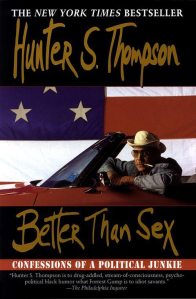This week I accomplished two of my summer goals: I completed my first internship and I finally gained access to my own Netflix account. One of these goals will help me further my career; it was an incredibly rewarding, challenging, and inspiring experience. The other is seen by most as a major distractor—a challenge to my productivity.
However, my last week with Netflix has taught me more than I expected. Or rather, it has served as a major reminder. You see, my internship was with a magazine that promotes justice movements, analyzes cultural phenomena, and highlights labor rights violations, but my focus on journalism is a bit broader, and also includes diplomacy and other political matters.
This week, I have watched various movies, but also many episodes of two shows: House of Cards and Gossip Girl. The former is new to me, and a Netflix original; the latter is one of my guilty pleasure favorites, and I have seen every episode. While the two shows have different focuses, different settings, and were created for different audiences, there are some striking similarities.
Now we get to the ‘reminder’ part—the knowledge these shows have bestowed upon me. Both shows involve abnormal amounts of wealth, manipulation, and duplicity. Both have characters that are ultracompetitive and constantly make morally questionable decisions. All of this has served as a reminder that I am venturing into a dangerous, competitive, shady environment. As I cover politics, I will no doubt encounter these intentions, these games, and these people.
All of this was also captured in a book I recently read: Hunter S. Thompson’s Better Than Sex, in which HST gives his one-of-a-kind gonzo-style account of the 1992 election. It includes memos from George Stephanopoulos, former President Bill Clinton, and CNN’s Ed Turner. He credits the idea behind the title to his friend Missy. Writing about the phrase, he said,
“And I had fallen for it. But so what? I am of the romantic sensibility, as they say, and I am easily swayed in that direction, which is dangerous…” (p. 221).
The idea behind the claim is basically that to the master game-players, who are the best of the best in their arena, politics is better—more enticing, more thrilling, more rewarding—than even sex. Many of his comments about politics—particularly U.S. politics—are spot on, or at the very least, thought-provoking:
“Politics is the art of controlling your environment.” (p. 64)
“Nixon was genetically dishonest and so is Bush [Sr.]. They both represent what Bobby Kennedy called ‘the dark underbelly of the American dream.’ ” (p. 105)
“They are politicians, nothing more. The truth is not in them, and they like it that way.” (p. 127)
“All governors love pretty girls. It’s the American way—unless you’re the President, and then it gets tricky. But some people never learn.” (p. 177-8)
“Politics is a very nasty business, win or lose, and you never really know whose side you’re on, especially when you win.” (p. 183)
Do I really want to venture into a world where all this game-playing occurs, when I know full well that the media often contributes to the over-publicized, crazy competitive sparring matches between career politicians that lead to a lack of legislative productivity? Well, as much as I must confess I crave a good game every now and then, what I really hope to do with my career is to promote cooperation and productivity at the political level—to push aside the games and focus on pressing issues and realistic solutions.
Most people would call it foolish and idealistic. Most people would call me crazy. So go ahead. I dare you. I promise I’ve already been called worse. But instead of name-calling, I commit myself to honest storytelling. I commit myself to promoting real progress. But to do so, I must dive into “the dark underbelly.” It’s fast and it’s dangerous.
HST’s book focused primarily on the 1992 presidential campaign and the election of Bill Clinton. Near the end, he said,
“Speed kills, they say, and speed is also very addictive. It gets you there faster, and fast is the only way to run if you want to be president of the United States. Buy the ticket, take the ride. Some will march on a road of bones, and others will be nailed up on telephone poles. That’s the way it works.” (p. 230)
